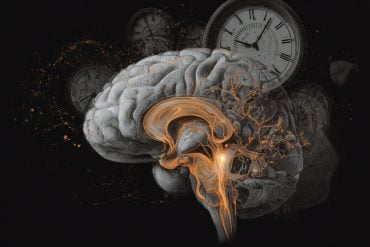Summary: Neural patterns of activity in the medial prefrontal cortex associated with the intention to drink alcohol are influenced by the genetic risk for alcohol use disorder.
Source: SfN
Neural activity that reflects the intention to drink alcohol is observed in the prefrontal cortex and is blunted in rats with a family history of excessive drinking, according to research from eNeuro. This insight could lead to novel treatments for alcohol use disorders.
The prefrontal cortex is a brain region involved in decision-making that becomes active before a behavior is initiated, indicating intention. David Linsenbardt, Nicholas Timme, and Christopher Lapish at Indiana University & Purdue University Indianapolis investigated neural activity in the prefrontal cortex to determine if it encodes the intention to consume alcohol.
Linsenbardt’s team compared activity before and during alcohol consumption in two types of rats. One modeled a family history of alcohol abuse, while the other lacked this family history. The prefrontal cortex was active during consumption in both types of rats, but only active pre-consumption in the rats without a family history of drinking.

These findings suggest that the prefrontal cortex directly encodes the intention to consume alcohol but less so in those with greater risk of abusing alcohol. Restoring prefrontal cortex activity in individuals with a predisposition to over-drink could be a new approach for treating alcohol use disorders.
Source:
SfN
Media Contacts:
Calli McMurray – SfN
Image Source:
The image is credited to Linsenbardt et al., eNeuro 2019.
Original Research: Closed access
“Encoding of the Intent to Drink Alcohol by the Prefrontal Cortex is blunted in Rats with a Family History of Excessive Drinking”. David N. Linsenbardt, Nicholas M. Timme and Christopher C. Lapish.
eNeuro. doi:10.1523/ENEURO.0489-18.2019
Abstract
Encoding of the Intent to Drink Alcohol by the Prefrontal Cortex is blunted in Rats with a Family History of Excessive Drinking
The prefrontal cortex plays a central role in guiding decision-making, and its function is altered by alcohol use and an individual’s innate risk for excessive alcohol drinking. The primary goal of this work was to determine how neural activity in the prefrontal cortex guides the decision to drink. Towards this goal, the within-session changes in neural activity were measured from medial prefrontal cortex (mPFC) of rats performing a drinking procedure that allowed them to consume or abstain from alcohol in a self-paced manner. Recordings were obtained from rats that either lacked or expressed an innate risk for excessive alcohol intake – Wistar or Alcohol Preferring ‘P’ rats, respectively. Wistar rats exhibited patterns of neural activity consistent with the intention to drink or abstain from drinking, whereas these patterns were blunted or absent in P rats. Collectively, these data indicate that neural activity patterns in mPFC associated with the intention to drink alcohol are influenced by innate risk for excessive alcohol drinking. This observation may indicate a lack of control over the decision to drink by this otherwise well-validated supervisory brain region.
Significance Statement:
Alcohol use disorders (AUDs) are fundamentally disorders in decision-making; specifically alcohol drinking decisions. Thus, identifying the neural mechanisms regulating drinking decisions may lead to unique prevention and intervention strategies. The current study demonstrates that the intent to drink alcohol is encoded by the activity of neural populations within the medial prefrontal cortex (mPFC). However, the encoding of this intention signal is greatly reduced in a population of rodents with an extensive family history of high alcohol consumption. These data suggest that identifying strategies to restore the contribution of mPFC in the decision to drink alcohol may provide effective targets to treat an AUD, particularly in those with family history of AUDs.






